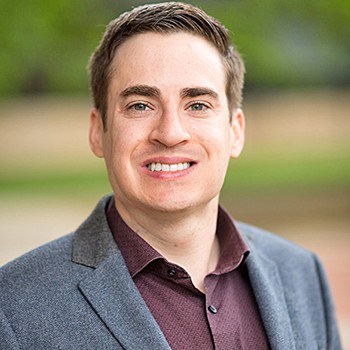Bryan Goldsmith is recognized by the American Institute of Chemical Engineers
Named to AIChE’s “35 under 35” list in honor of his accomplishments in energy and environmental research.
Named to AIChE’s “35 under 35” list in honor of his accomplishments in energy and environmental research.

Like many high school students, Bryan Goldsmith was unsure what career to pursue after graduating. This all changed when his high school chemistry teacher, Lisa Dickens—who was a chemical engineer by training, showed him the beauty of molecules and chemical reactions! “A passion for STEM was lit inside me from this experience and I have never looked back. I believed that chemical engineering was a great route to combine my interests in chemistry and my desire to address global problems in energy and the environment.”
As a first-generation college student, Goldsmith followed through with his plans to solve energy and environmental challenges and majored in chemical engineering, receiving his BS in chemical engineering at the University of California Riverside in 2010 and his PhD in chemical engineering at the University of California Santa Barbara in 2015.
This year, in honor of his accomplishments in energy and environmental research, Goldsmith, Dow Corning Assistant Professor, was named to AIChE’s 35 under 35 list of outstanding young chemical engineers who have made significant contributions to the field of Chemical Engineering and AIChE.
Bryan has already published a number of contributions in the area of machine learning and data science in catalysis and material science. I believe that some of these are foundational papers that will guide our field in near future. I enjoy working with him and look forward to future collaborations.
suljo linic
Goldsmith’s research lab is dedicated to training the next generation of researchers to solve major societal challenges pertaining to energy and the environment. His lab has expertise in first-principles computational modeling and data science to understand and predict catalysts and materials for use in sustainable chemical production, energy storage, and pollution reduction.
Suljo Linic, Martin Lewis Perl Collegiate Professor of Chemical Engineering, says, “He is off to a great start at Michigan. Bryan has already published a number of contributions in the area of machine learning and data science in catalysis and material science. I believe that some of these are foundational papers that will guide our field in near future. I enjoy working with him and look forward to future collaborations.”
A major goal for Goldsmith’s future research is to combine machine learning with computational modeling and experimentation to accelerate the design of catalysts for energy and environmental applications. “I believe machine learning has great potential to accelerate catalyst design and discovery if properly utilized,” he says.
As an educator, he plans to continue creating curriculum to teach chemical engineering graduate and undergraduate students how to exploit data science and machine learning to solve challenges in their fields of interest. Goldsmith is also working to continue the legacy of excellence for the AIChE Student Chapter at Michigan as the new faculty chapter advisor.
Goldsmith joined the department’s faculty in 2017 as an assistant professor. Before coming to Ann Arbor, he was a Humboldt Postdoctoral Fellow at the Fritz Haber Institute of the Max Planck Society in Berlin, Germany.